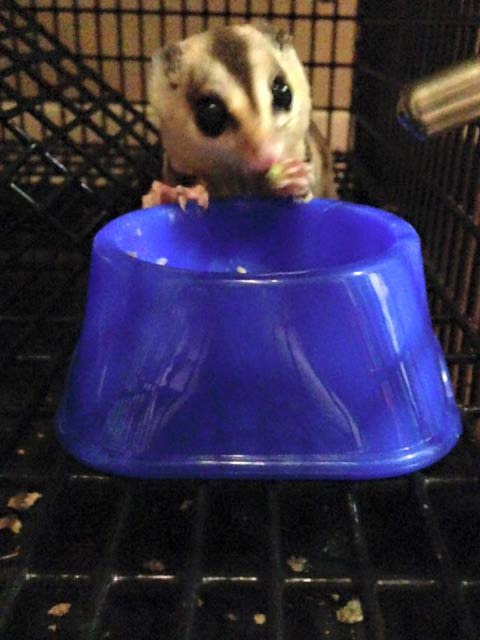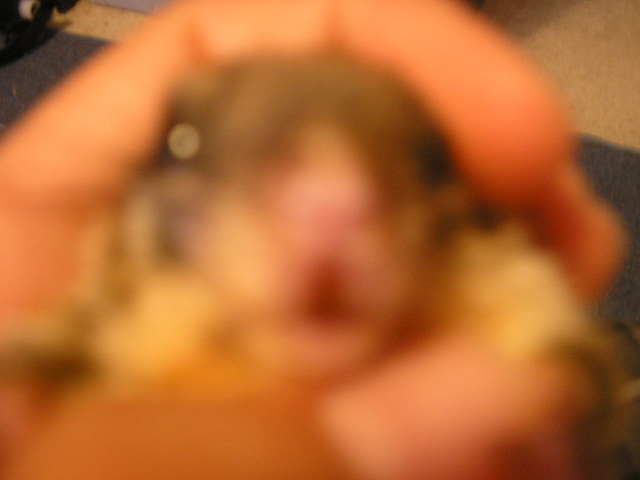QuestionHello Laurie,
I'm 15 and my mom has a family member who raises sugar gliders. His pair just had babies a couple months ago and he says he is giving them away, cage, food, sugar glider and all they need to live nice long lives. As a 15 year old i do have school 7:30 am to 3:30 pm. I do not have many activities to attend to so i am at home most of the time. However about 1 weekend a month i go to my cousins house in Pueblo Colorado (I live in Colorado Springs Colorado) for the weekend. My question to you Laurie is, am i ready for a sugar gilder, i have talked to my family about and and we a seriously considering it. Are sugar gliders in any way a VERY difficult animal to take care of? I have heard they need a special diet and need lots of attention and these will be no porblem for me to provide (excluding to weekend i leave). I would like to know some basic information about Sugar Glidars and the responsabilities i have ahead if i choose to get one. If i do i think ill get 2 females, is this better than 2 males? I have heard that the males spray, this will be a problem if the females also do. Me being a 15 year old i do have friends over from time to time, is this a good idea, for the sugar glidars sake? Or is this more an adults animal rather than a teens? I here they are hard work but it is all paid off with the love and affection the gliders give you, do they bond well with people? Is one better than two? I like animals that bond with me and arnt in there own little world and i can only watch and not hold them. Sorry to pour all this on you but i want to be ABSOLUTLEY sure that i will be able to take on the challenge of these cute creatures. THANKS SO MUCH FOR YOUR TIME!
AnswerHi. Thanks for contacting me and doing your research before you get a sugar glider. I have recently written to a couple of young people and their parents about the exact same question. It is a very good thing that you are thinking long and hard before you take them on. Here is was I recently wrote to a young man.
Before you get any sugar glider, you should think carefully about a few issues:
1. The number one age group from which we get rescued sugar gliders is from minors. Usually teenagers are very excited to get sugar gliders, but there is so much work involved with taking care of them, an odor, daily commitment, that way too many kids are giving them up, or rather their parents are insisting on finding the gliders new homes.
2. The next age group from which we get rescued sugar gliders is from young adults. Sugar gliders live 10-12 years, so you at 16 will be 26 in ten years. Do you plan to go to college, have a career, kids, move to an illegal state? All of these factors happen to people and at your age, it is difficult to say what your choices will be.
3. Can you honestly say that you can give your sugar glider the attention and it deserves for the rest of it's life? If not, there are consequences. Sugar gliders can have many issues from being torn away from their bonded humans. These range from eating problems to hair loss and self-mutilation, like chewing their tails off. (This happened to one young rescue that came here when his bonded owner went off to college.)
4. Sugar gliders are best kept in pairs. It can be difficult and requires two cages to introduce two adult gliders.
5. Sugar gliders are a huge commitment and a lot of work. They cannot be fed pellets and left for the weekend like a hamster. They require a fresh food diet that needs to be put in every night and taken out every morning. They require at least 2 hours of play time every night and bonding time during the day. You will need to find someone to come in and take care of them if you have to leave even overnight. You and your parents need to assess your lifestyle. If you travel or take vacations, who will take care of your pet?
6. Sugar gliders are nocturnal, so most people are asleep for most of the time they are awake.
7. Sugar gliders have an odor. Neutering the males will cut it down somewhat, but all sugar gliders have a musky odor.
8. There are many ongoing costs to owning a sugar glider. Vet bills for exotic animals are very expensive. Cages, toys, pouches, water bottles, ingredients for diet, fresh food, eggs, chicken (cooking same), mealworms. A lot of things will need to be ordered online because you can't buy them at Petsmart or Petco.
9. Sugar gliders require a proper diet. Do not listen to anyone that tells you that you can feed them hard pellets and a piece of apple. There is so much more to their diet to keep them healthy. There are people that got their gliders from hobby breeders that pass along incorrect information about care and diet. Then they tell their friends and before you know it there is a whole lot of bad information out there about sugar gliders.
So _____, I ask you to address these issues with yourself (be honest with yourself) and with your parents regarding the real issues of owning sugar gliders. As a rescuer, I have the sugar glider's best interest at heart. I have adopted to many young people who promised me their forever loyalty to their pets, only to have them contact me in a few months or a few years requesting me to find a home and take their pet back. It's really not a decision to take lightly.
So, Kyle, to answere your specific questions:
Two females is easier than two males because you don't need to deal with neutering. Males don't "spray," but they do mark. So do females, however, males scent glands are much stronger. All sugar gliders have some degree of odor, males and females. Neutering will significantly cut the odor from males.
I would not let your friends hold your gliders.
The hard work is paid off by the love and affection they give you if you are a committed, forever, loving owner.
They will bond with people, but it can be a long process.
One is never better than two.
Sugar gliders don't start out bonded. They can be frightened and afraid and can bite and draw blood.
Thank you for your questions. I hope I have helped you make the right decision for you, your family and the gliders.

 Untamed Rescued Sugar Gliders
Question
Ivey Chloe
Hi, I just rescued two
Untamed Rescued Sugar Gliders
Question
Ivey Chloe
Hi, I just rescued two
 Not sure whether is my suggies are growing well compared to the new glider size
Question
Glider KK
Hi Kaden, im jeremy, just started to
Not sure whether is my suggies are growing well compared to the new glider size
Question
Glider KK
Hi Kaden, im jeremy, just started to
 Sickness
QuestionBrown Teeth
QUESTION: My sugar glider ha
Sickness
QuestionBrown Teeth
QUESTION: My sugar glider ha
 baby sugar glider ! how to take care of it ?
QuestionI own a sugar glider which is just a baby. When
baby sugar glider ! how to take care of it ?
QuestionI own a sugar glider which is just a baby. When
 Wild caught sugar glider.
QuestionQUESTION: Hi...Im from Malaysia. Recently, my u
Wild caught sugar glider.
QuestionQUESTION: Hi...Im from Malaysia. Recently, my u